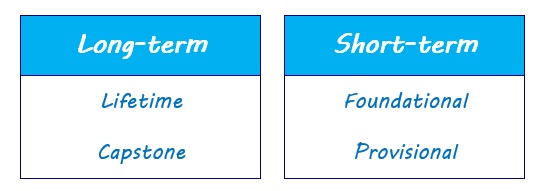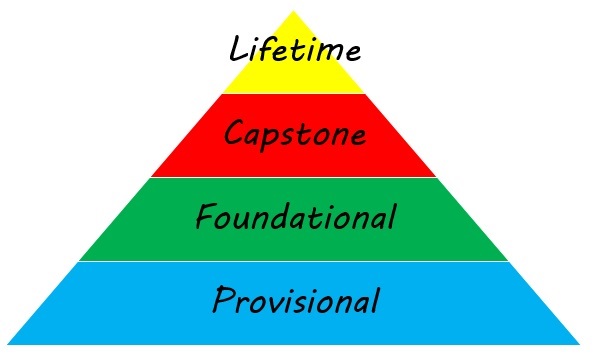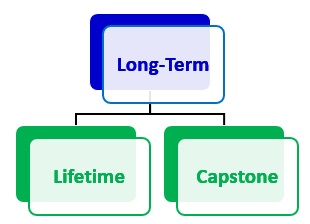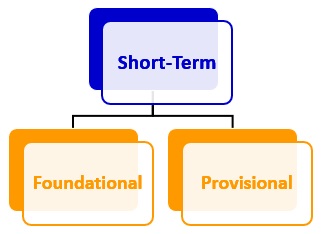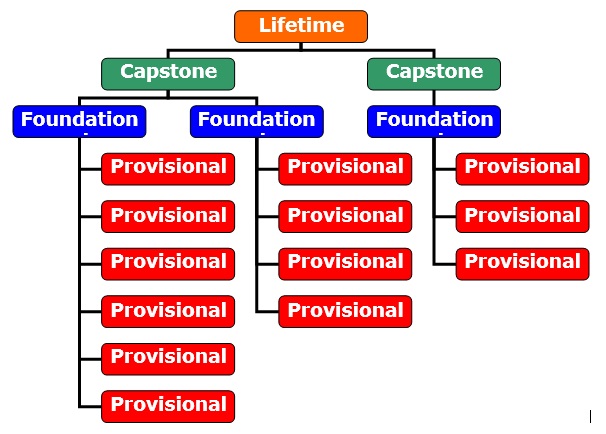Types of Goals
Generally, goals are categorized as either long-term or short-term. Long-term goals consist of plans you make for your future, typically over a year down the road. These typically consist of family, lifestyle, career, and retirement goals. Long-term goals are achieved over time as a person completes the stages of their life. People set long-term goals for themselves by envisioning what they want to be doing and where they want to be five to twenty years from the present. Then they use short-term goals to get there.
Examples of long-term goals
- Become a Mechanical Engineer
- Get a Master’s Degree
- Buy a house
- Run a marathon
- Own my own company
- Retire at age 55
Short-term goals are ones that a person will achieve in the near future, typically in less than one year. Short-term goals are often, but not always, steppingstones on the way to achieving long-term goals. These types of goals are considered enabling goals because accomplishment of these goals will “enable” you to achieve an even greater goal.
Enabling goals usually consist of such topics as education, short-term jobs or projects, as well as valuable work experience. Each of these often contributes directly to the long-term goals a person sets for himself or herself.
Examples of short-term goals
- Lose five pounds
- Paint my living room
- Get an “A” in Biology
- Get a 3.2 GPA or above this semester
- Build a deck
- Get a job for the summer
Long-term & Short-term Subdivided
These two categories, long and short-term goals, can be further subdivided. Long-term goals can be either lifetime goals or Capstone goals, while short-term goals can be further categorized be either foundational or provisional goals.
Long-term Goals
Lifetime Goals
Lifetime goals are those major goals that you would like to accomplish over your lifetime. Depending on your age, these goals may be accomplished significantly later on in your life. Typically, these goals will have accomplishment dates of ten or more years in the future. Examples of lifetime goals include get a job as a teacher, become a professional basketball player, graduate from college, buy a house, or retire to Florida.
Lifetime goals may fall into one of several categories including career, education, family, financial, or just pleasure. You can have a Lifetime goal to become an accountant as well as goals of getting a Master’s Degree, having four children, making ten million dollars, and/or traveling around the world.
Lifetime goals are often general at first but as you work towards them, they become more specific. The original goal of “get a job as a teacher” becomes “Get a job teaching math to high school students,” which later evolves into “enter a career in teaching Trigonometry and Calculus to high school seniors.” As time goes on, the more defined your goals will become.
Lifetime goals often are your most meaningful and important goals. One problem, however, is that the achievement of these goals is usually far in the future. As a result, you may have trouble staying focused and maintaining a positive attitude toward reaching these goals. This is why it is helpful to set up enabling goals.
Enabling goals
An enabling goal is a distinctive type of shorter term goal. It is written to help achieve a longer-term goal. Enabling goals are like stepping stones that help us measure our progress toward reaching longer term goals. They can be considered “objectives” of long term goals.
“You must have long term goals to keep you from being frustrated by short term failures.” Charles C. Noble
Capstone Goals
Capstone goals are commonly those key goals you will need to accomplish first before you accomplish your lifetime goals. These goals will typically be accomplished in one to ten years’ time. A Lifetime goal of becoming a doctor would have Capstone goals of going to college, going to med school, and completing an internship. A lifetime goal of traveling around the world would have a Capstone goal of saving a certain amount of money.
“To accomplish great things, we must not only act, but also dream, not only plan, but also believe.” Anatole France
Short-term Goals
Foundational Goals
Foundational goals are those short-term goals that will most likely be accomplished in less than one year. These may be enabling goals that may need to be accomplished prior to the Capstone goals being met. They are often used as physiological improvements. You need to get straight A’s next semester in order to get into a good college, so that you can eventually go to medical school. However, Foundational goals can also be stand-alone goals with no link to a Capstone goal or a Lifetime goal. This could be making your high school basketball team, learning how to play three songs on the piano, or saving money for a home theatre system.
“The tragedy of life doesn’t lie in not reaching your goal. The tragedy lies in having no goals to reach.” Benjamin Mays
Provisional Goals
Provisional (stepping-stone) goals are usually stepping-stones to the larger goals. Typically, these are completed in less than a month. These are the types of goals you focus on a daily basis and are often used for technical improvements. Many times these may be enabling goals that may need to be accomplished prior to the foundational goals being met. “Get a 90 or better on the Algebra test next week”, which will help meet the goal of getting straight A’s next semester in order to get into a good college, so that you can eventually go to medical school. However, like Foundational goals, provisional goals can be stand-alone goals with no link to a Lifetime, Capstone, or a short-term goal. This could be “paint the house”, “clean the basement”, or “finish a school project.”
Related Pages
Goal Setting Overview



